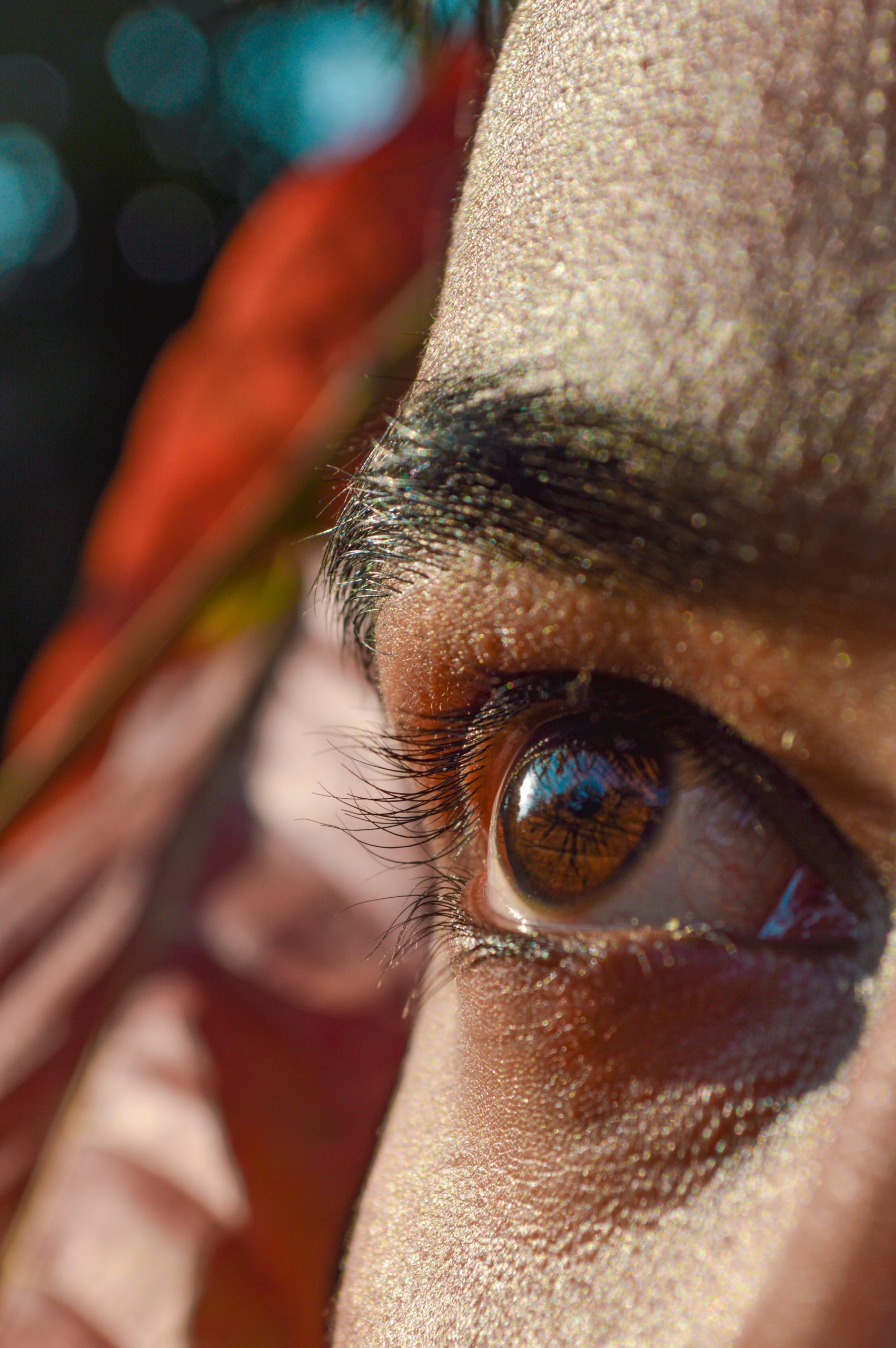

In 1974, Marina Abramović performed Rhythm 0 in Naples. The six hour performance art piece saw Marina put the fate of her body in the hands of the audience.
Instructions:
There are 72 objects on the table that one can use on me as desired.
Performance.
I am the object…
During this period I take full responsibility.
Duration: 6 hours (8 pm – 2 am).
The audience started off tame, doing things like tickling her with a feather, or drawing on her body. But by the time the performance was over, she stood there naked.
“I was really violated: they cut my clothes, they put the thorns of the roses in my stomach, they cut my throat, they drank my blood, one person put the gun in my head and then another took it away.”
Such violent displays of behaviour and the corresponding escalation raise questions about how these things happen. Is this what human nature resorts to, when there are no rules? Are humans, when given too much power, inherently bad?
Various instances in history communicate this negative message. Whether it came to authoritarian leaders, or Zimbardo’s famous Stanford Prison Experiment, the same argument would eventually come up – that with too much power things would turn sour. Leaders would get paranoid, and turn to inhumane tactics to stay in power (think of the Great Terror under Stalin), and students at Stanford university – when given the role of prison guard – turned into brutal oppressors within a matter of days.
Notably, the latter turned out to be the result of instructions on how to behave by Zimbardo himself, who played the role of a superintendent (not good research practices, if you ask me). In a post-WWII era plagued by questions on the capability of human brutality, these findings fueled the idea that humans are capable of heinous acts. And while the Stanford Prison Experiment has since lost a significant amount of its robustness, our ‘prison guards’ still went to great lengths to use their position of power to oppress their weaker counterparts in the role of prisoner. It seems there is some truth to this sentiment that power drives us astray.
If we consider zero-sum logic, which is the notion that there always has to be a ‘loser’ in order for there to be a winner, we can better understand why individuals are sometimes reluctant to give up power. This stems from a fear of losing one’s own privileges and spearheads the belief that if one group’s rights and protection were to progress, those of other groups would have to regress. A view like this gives context to things like the All Lives Matter movement. Perhaps it is less the pursuit of power that corrupts, but more the fear of losing it.
A study using TMS found differences in cognitive functioning between more and less powerful individuals (Hogeveen et al., 2014). More specifically, power appeared to disrupt their ability to mirror1Mirroring is a mental process commonly found in humans, which involves mimicking others’ behaviour, such as yawning when someone yawns., suggesting lower levels of empathy and maybe even higher feelings of disconnectedness to others. In addition to this, power may also place a pair of cynical-coloured glasses in front of your eyes when viewing generous acts by others (Inesi et al., 2012).
Now, how does any of this relate to what happened to Marina Abramović? It turns out, during her performance, a fight broke out between audience members, with some individuals trying to protect her. Dutch historian and author Rutger Bregman tackles many of these questions about human nature in his book Humankind (Bregman, 2020). He uses modern research to support his core idea that – at the end of the day – most of us are actually good, a view supported by Humanistic Psychology. If we assume this to be true, then it must be our circumstances that drive us to abuse our authority and exploit the weak. Taking this one step further, our focus should then be on policies that tackle structural inequality, rather than individual deviance. If we start by fostering a culture of empathy and an understanding that power is not a zero-sum game, then maybe just maybe we can take away its power to corrupt.
Photo by Aryan Dhiman on Unsplash.
References
– Bregman, R. (2020). Humankind: A Hopeful History. Bloomsbury Publishing.
– Hessel, K. (2023, Sep. 25). Marina Abramović’s shocking Rhythm 0 performance shows why we still cannot trust people in power. The Guardian. https://www.theguardian.com/artanddesign/2023/sep/25/marina-abramovics-shocking-rhythm-0-performance-shows-why-we-still-cannot-trust-people-in-power
– Hogeveen, J., Inzlicht, M., & Obhi, S. S. (2014). Power changes how the brain responds to others. Journal of experimental psychology. General, 143(2), 755–762. https://doi.org/10.1037/a0033477
– Inesi, M. E., Gruenfeld, D. H., & Galinsky, A. D. (2012). How power corrupts relationships: Cynical attributions for others’ generous acts. Journal of Experimental Social Psychology, 48(4), 795-803.
– Reynolds, C. J., Knighten, K. R., & Conway, P. (2019). Mirror, mirror, on the wall, who is deontological? Completing moral dilemmas in front of mirrors increases deontological but not utilitarian response tendencies. Cognition, 192, 103993. https://doi.org/10.1016/j.cognition.2019.06.005
– Le Texier, T. (2019). Debunking the stanford prison experiment. American Psychologist, 74(7), 823.
– Ward, F. (2012). No innocent bystanders: Performance art and audience. UPNE.

Photo by Aryan Dhiman on Unsplash
In 1974, Marina Abramović performed Rhythm 0 in Naples. The six hour performance art piece saw Marina put the fate of her body in the hands of the audience.
Instructions:
There are 72 objects on the table that one can use on me as desired.
Performance.
I am the object…
During this period I take full responsibility.
Duration: 6 hours (8 pm – 2 am).
The audience started off tame, doing things like tickling her with a feather, or drawing on her body. But by the time the performance was over, she stood there naked.
“I was really violated: they cut my clothes, they put the thorns of the roses in my stomach, they cut my throat, they drank my blood, one person put the gun in my head and then another took it away.”
Such violent displays of behaviour and the corresponding escalation raise questions about how these things happen. Is this what human nature resorts to, when there are no rules? Are humans, when given too much power, inherently bad?
Various instances in history communicate this negative message. Whether it came to authoritarian leaders, or Zimbardo’s famous Stanford Prison Experiment, the same argument would eventually come up – that with too much power things would turn sour. Leaders would get paranoid, and turn to inhumane tactics to stay in power (think of the Great Terror under Stalin), and students at Stanford university – when given the role of prison guard – turned into brutal oppressors within a matter of days.
Notably, the latter turned out to be the result of instructions on how to behave by Zimbardo himself, who played the role of a superintendent (not good research practices, if you ask me). In a post-WWII era plagued by questions on the capability of human brutality, these findings fueled the idea that humans are capable of heinous acts. And while the Stanford Prison Experiment has since lost a significant amount of its robustness, our ‘prison guards’ still went to great lengths to use their position of power to oppress their weaker counterparts in the role of prisoner. It seems there is some truth to this sentiment that power drives us astray.
If we consider zero-sum logic, which is the notion that there always has to be a ‘loser’ in order for there to be a winner, we can better understand why individuals are sometimes reluctant to give up power. This stems from a fear of losing one’s own privileges and spearheads the belief that if one group’s rights and protection were to progress, those of other groups would have to regress. A view like this gives context to things like the All Lives Matter movement. Perhaps it is less the pursuit of power that corrupts, but more the fear of losing it.
A study using TMS found differences in cognitive functioning between more and less powerful individuals (Hogeveen et al., 2014). More specifically, power appeared to disrupt their ability to mirror2Mirroring is a mental process commonly found in humans, which involves mimicking others’ behaviour, such as yawning when someone yawns., suggesting lower levels of empathy and maybe even higher feelings of disconnectedness to others. In addition to this, power may also place a pair of cynical-coloured glasses in front of your eyes when viewing generous acts by others (Inesi et al., 2012).
Now, how does any of this relate to what happened to Marina Abramović? It turns out, during her performance, a fight broke out between audience members, with some individuals trying to protect her. Dutch historian and author Rutger Bregman tackles many of these questions about human nature in his book Humankind (Bregman, 2020). He uses modern research to support his core idea that – at the end of the day – most of us are actually good, a view supported by Humanistic Psychology. If we assume this to be true, then it must be our circumstances that drive us to abuse our authority and exploit the weak.
Taking this one step further, our focus should then be on policies that tackle structural inequality, rather than individual deviance. If we start by fostering a culture of empathy and an understanding that power is not a zero-sum game, then maybe just maybe we can take away its power to corrupt. <<



